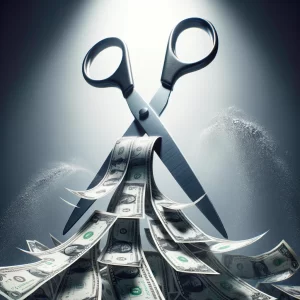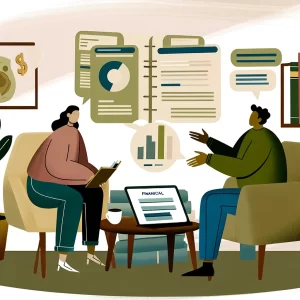In the realm of personal finance, certain experts stand out not just for their groundbreaking advice but also for the debates they ignite. These financial influencers have garnered substantial followings with their bold strategies and polarizing opinions, often walking the fine line between genius and controversy. From advocating for extreme frugality to promoting high-risk investment strategies, their unconventional approaches have both inspired success stories and drawn criticism. Here, we explore 11 of the most talked-about personal finance gurus, delving into the controversies that surround them and the philosophies they champion.
1. Dave Ramsey: The Anti-Debt Crusader
In the world of personal finance gurus, few names are as well-known as Dave Ramsey. Dave Ramsey’s staunch anti-debt stance and “baby steps” to financial freedom have made him a household name. Advocating for aggressively paying off debt and building wealth through savings and investments, Ramsey’s methods have been life-changing for many. However, critics argue that his aversion to credit and strict budgeting guidelines may not be suitable for everyone, particularly in an economy that often necessitates credit usage.
2. Suze Orman: The Financial Straight-Talker
Suze Orman’s no-nonsense approach to personal finance, emphasizing emergency savings, smart investing, and cautious spending, has earned her a vast audience. Yet, her sometimes conservative investment advice and cautionary stance on debt have faced scrutiny, especially from younger generations seeking more aggressive growth strategies.
3. Robert Kiyosaki: The Real Estate and Business Mogul
Best known for “Rich Dad Poor Dad,” Robert Kiyosaki’s advocacy for financial education, real estate investment, and entrepreneurship challenges traditional paths to financial success. While many praise his insights into wealth-building, others question the feasibility of his methods and his emphasis on leveraging debt.
4. Tim Ferriss: The Lifestyle Design Architect
Tim Ferriss, author of “The 4-Hour Workweek,” champions the concept of lifestyle design and passive income streams as a path to financial independence. His unconventional work philosophies and income automation strategies have inspired many but have also been critiqued for their applicability to the general population.
5. Grant Cardone: The 10X Rule Innovator
Grant Cardone’s “10X Rule” encourages massive action to achieve financial success, particularly through sales effectiveness and real estate investments. While his high-energy approach and success stories are compelling, some critics question the sustainability and risk level of his strategies.
6. Ramit Sethi: The Wealth Psychology Expert
Ramit Sethi’s “I Will Teach You to Be Rich” combines personal finance advice with a focus on behavioral change and psychological approaches to spending and saving. While praised for his practical strategies, Sethi’s sometimes unconventional advice on spending big on what you love while cutting mercilessly on what you don’t have sparked debate.
7. Tony Robbins: The Financial Motivator
Tony Robbins, while primarily known for his motivational speaking, has also entered the financial advice arena with books like “MONEY Master the Game.” His approach to financial freedom through self-empowerment and investment has been inspirational for many, though some financial experts question the depth and originality of his advice in the complex realm of personal finance.
8. Jim Cramer: The Stock Market Enthusiast
Jim Cramer’s energetic and entertaining take on stock market investments on “Mad Money” has made investing more accessible to the general public. However, his critics often point out the inherent risks in his often speculative and short-term investment picks.
9. Gail Vaz-Oxlade: The No-Gimmick Money Maven
Gail Vaz-Oxlade’s straightforward and practical advice on budgeting and debt management, as seen in “Til Debt Do Us Part,” offers a no-gimmicks approach to personal finance. While her methods are praised for their accessibility and effectiveness, some argue that her advice can be overly simplistic for more complex financial situations.
10. Peter Schiff: The Economic Doomsayer
Peter Schiff’s bearish outlook on the U.S. economy and his advocacy for investing in gold and international markets position him as a contrarian in the personal finance space. His predictions of economic downturns and skepticism towards mainstream investment wisdom attract both followers and detractors for their perceived fear-mongering.
11. Barbara Corcoran: The Entrepreneurial Spirit Guide
Barbara Corcoran’s rise from a diner waitress to a real estate mogul and “Shark Tank” investor embodies the entrepreneurial dream. Her advice often focuses on the grit and determination needed to succeed in business and real estate, though some caution against the inherent risks in entrepreneurial ventures.
The World of Personal Finance Gurus
These personal finance experts have undeniably shaped the conversation around wealth and financial management, each bringing their unique perspective to the table. While their advice may not resonate with everyone, the diversity of their strategies underscores the multifaceted nature of personal finance. Whether viewed as innovators or opportunists, their influence on their followers’ financial decisions is undeniable, highlighting the importance of critical thinking and personalized strategies in personal finance.
Catherine is a tech-savvy writer who has focused on the personal finance space for more than eight years. She has a Bachelor’s in Information Technology and enjoys showcasing how tech can simplify everyday personal finance tasks like budgeting, spending tracking, and planning for the future. Additionally, she’s explored the ins and outs of the world of side hustles and loves to share what she’s learned along the way. When she’s not working, you can find her relaxing at home in the Pacific Northwest with her two cats or enjoying a cup of coffee at her neighborhood cafe.
















